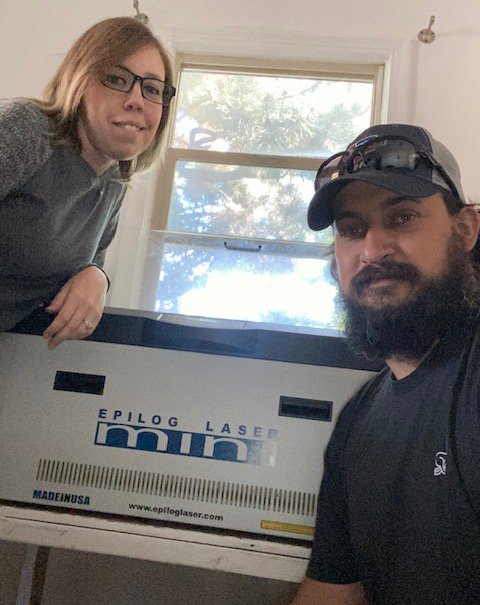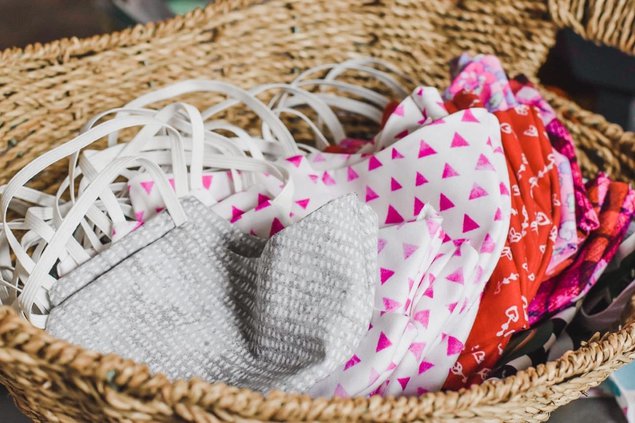Masks can be hard to come by these days, but Turlock residents are making it easier for the community and those on the frontlines to protect themselves against COVID-19.
With the Centers for Disease Control and Prevention recommending members of the public wear cloth face coverings when they go out, masks are in high demand not only for members of the public, but healthcare workers as well. This inspired Turlock residents Monique Riley and Adalai Castro to jump into action when they realized there was such a widespread need for the easily-made face coverings.
Riley, a stay-at-home mom of two, previously spent her days hand-crafting earrings, party favors, t-shirts and other gifts through her business, Jayde Elliott Designs. These days, however, her business has transformed into a full-fledged mask-making operation, with Riley sewing 30 to 40 masks per day.
A former nursing student herself, Riley was inspired to give back when she thought of those working unprotected.
“Before my kids were born I was in nursing school, but after I found out I was pregnant I had to put school on hold to take care of my kids,” she said. “I can’t help but think it would be me out there in the hospitals right now if they were not born. I felt like I needed to do something to help.”
So far, Riley has donated over 200 masks to several hospitals in need, she said, and has started selling them to the public on her website (www.jaydeelliottdesigns.com) for $6 apiece due to growing demand.
“I think protecting our frontlines, the healthcare workers, is so important and it’s awful that they do not have access to proper PPE,” Riley said. “Recently, the CDC has recommended the public wear masks to reduce the spread, and reducing the spread will protect our healthcare workers.”
Castro has also spent time donating masks to healthcare workers as well as selling them to the community in order to help support the philanthropic effort. She was inspired after watching a news report which focused on the lack of personal protective equipment for healthcare workers.
“A reporter said hospitals across the U.S. don’t have enough masks and ventilators. That broke my heart,” Castro said.
She has friends and family members who work in local hospitals, she added.
“They are fighting this invisible foe they know little of, every waking hour. I had to make a choice — stay in my fear and be complacent, or help my community using preventive measures and supplying an urgent need.”
Castro chose to make a difference, using cotton fabric, elastic, filter material and her sewing machine to sew masks in bulk. Each mask takes her about five to seven minutes to make, she said, and once complete, Castro delivers the masks to hospital workers, those at risk of catching COVID-19 and members of the community who have purchased from her.
Castro’s masks are sold for $8 apiece, and those interested in purchasing a mask or receiving a donation can contact her at 209-499-9096 or by emailing paradiseloving101@gmail.com.
Giving back through such a simple task has helped Castro through the crisis, she said.
“It has helped me a lot, mentally. I’m not just thinking about me but we, us. I’ve gotten a bigger understanding that we are all in this together. I’ve gotten a bigger appreciation of the little things in life like a hug, a smile, a simple ‘how are you’ and being in the moment and listening to the other individuals,” she said.
Turlock City Councilmember Andrew Nosrati is also working with local nonprofits who are in need to spearhead a mask-collecting campaign, and Ashlee Baba of local business Laser Solutions reached out to answer the call. The CO2 laser that Baba uses from home to operate her business is typically used to engrave personalized messages on cups, wooden signs and other mementos, but has now been repurposed to cut masks with precision.

“There are a lot of people in need right now, and to have our laser not really producing anything for home decor or craft shows we can’t go to, I figured it might as well be running to make masks,” Baba said. “So, we came up with a no-sew pattern that the laser can cut out fairly quickly.”
It takes the machine about a minute to cut the patterns for four masks at a time, then Baba simply weaves elastic through the holes in the material. Rather than looping behind the wearer’s ears, the elastic is worn behind the neck and held together with a clip that can be adjusted to various sizes.
So far, Laser Solutions has donated 50 masks and plans on making many more. Nonprofits or other organizations in need of masks can contact Baba at 209-648-5733 or by emailing lasersolutions19@gmail.com.
“Everyone needs a mask now, it looks like,” Baba said. “We’re at home in quarantine and might as well put this machine to good use.”
CDC recommends wearing cloth face coverings in
public settings where other social distancing measures are difficult to
maintain (e.g., grocery stores and pharmacies), especially in areas of
significant community-based transmission.
The CDC also advises the use of simple cloth face coverings to slow the spread
of the virus and help people who may have the virus and do not know it from
transmitting it to others. Cloth face coverings fashioned from household items
or made at home from common materials at low cost can be used as an additional,
voluntary public health measure.
Cloth face coverings should not be placed on young children under age 2, anyone
who has trouble breathing, or is incapacitated or otherwise unable to remove
the cloth face covering without assistance.
The cloth face coverings recommended are not surgical masks or N-95
respirators. Those are critical supplies that must continue to be reserved for
healthcare workers and other medical first responders, as recommended by
current CDC guidance.
For more information or instructions on how to make a face covering of your own, visit www.cdc.gov.









